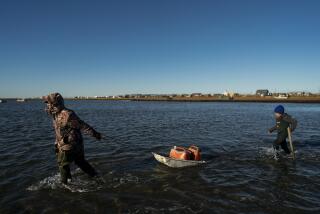Remote Alaska Island Dials the Right Number
- Share via
ANCHORAGE, Alaska — America’s most remote community just got a little closer.
Little Diomede Island--a speck sticking out of the Bering Strait between Asia and North America just 2 1/2 miles from the Soviet island of Big Diomede--now has something most Americans take for granted: Telephones.
Little Diomede is home to 176 people, most of them Alaska Eskimos, who live in a village that faces west toward the Soviet Union. In winter, when the Bering Strait freezes, it is possible to walk across the International Dateline to Siberia.
But only now has it become possible, from the comfort of your Little Diomede home, to pick up the telephone and call another American city.
Cash-Free Economy
“I called my sister-in-law long distance in Cooper Landing (an Alaska town south of Anchorage),” said Dora Ahkinga, who made the first call using Little Diomede’s new telephone system.
“She was surprised to hear from me,” Ahkinga said in a telephone interview from Little Diomede. “I told her I was calling from home, from my own house. I call other places, too.”
The Inupiaq-speaking Eskimos of Little Diomede live in a virtually cash-free economy and survive by hunting walrus and polar bear and other sea creatures, and some expect to pay their phone bills by barter--trading walrus ivory carvings to Bob Blodgett, Mukluk Telephone Co. president, as payment.
Blodgett, who calls himself “the white trader at Teller,” an Alaska mainland village on the Bering Sea coast, said he has long wanted to expand his small phone company to Diomede.
Mukluk provides phone service to 13 western Alaska Eskimo villages, places like Elim, Golovin, Koyuk, Shishmaref, Shaktoolik and Wales.
Blodgett, 68, left Union County, Iowa, to come to Alaska in 1946, serving in the first state Legislature in 1959. He has lived in Teller 33 years, running the store and the utilities and serving as the local “white trader.”
“We’ve taken furs, ivory carvings and mukluks (boots) and treat it like money,” he said. “Ivory is just like money. We ship it to shops all over the state.”
Blodgett said Mukluk spent $100,000 to install Diomede’s phone system, and he charges $135 for a hook-up, $15.20 monthly, not counting long distance calls.
Until now, Diomede got by with a single phone in the village building. Lines formed to use it and it often went dead. When someone received a call, the Diomede city clerk paged the person using an intercom-type system wired into people’s television sets so residents often kept their TVs on.
Now half the homes have phones, said Howard Ozenna, the local Mukluk agent.
“I’m real happy about it,” said Roger Kunayak Sr., village store clerk. “Now we don’t have to wait in line two or three hours to order food.”
Some Diomede residents have mixed feelings about the phone system. “Answering the phone takes away from my teaching if you want to know the truth,” said high school teacher Larry Preszler. “But communication between us and the school district is better.”
Preszler figures technical problems--lines heavy with ice knocking out service--will be worked out, but he’s not so sure about cultural problems.
“This is a subsistence economy, and people are getting into trouble with their bills already,” he said. “People really wanted to have telephones, and they’ve been coming to me for help. I was buying ivory and loaning money and doing all kinds of things to allow people to get phones hooked up.”
Because the school provides rare cash jobs on the island, Diomede Eskimos in need of money often approach teachers to buy ivory. Preszler said the traditional subsistence culture may collide with America’s cash economy over the phone system, despite Blodgett’s promise to barter.
But phones are just the latest change on Diomede. “When I first came here,” Preszler said, “there was no satellite television. Now we have it. There was no water system. Now we have water. There was no village power. We have power. Now we have telephones.” Mail still arrives once a week by helicopter, weather permitting, and provides the only summer transportation, space permitting. In winter, when the sea freezes, small passenger planes can land on the ice.
Bettering a Last-Place Finish
It used to be that when America went to the polls to vote, Little Diomede’s ballots were among the last to be tallied. Election results went out by mail and were phoned out if the lone phone worked. In November’s general election, Diomede reported its vote election night, thanks to the brand new phones.
Several other villages in Alaska remain one-phone towns, and there are places with no phones.
What’s next for Little Diomede? Ahkinga is thinking of ties to nearby Soviet territory, now that the “ice curtain” border seems to be thawing--including a telephone link to Big Diomede or beyond.
“I hope so,” she said. “Maybe they can even hear us now.”
More to Read
Sign up for Essential California
The most important California stories and recommendations in your inbox every morning.
You may occasionally receive promotional content from the Los Angeles Times.












